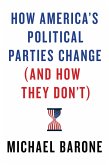Each of the three movements rejected older republican principles of governance in favor of an administrative state. But there were substantial differences between Teddy Roosevelt's Anglo-Protestant progressive social gospelers, who battled trusts and curbed immigration; Franklin Roosevelt and Lyndon Johnson's secular liberals, who initiated government-business partnership and a civil rights agenda; and the 1960s radicals, who protested corporate influence in the Great Society, liberal hypocrisy on race and gender, and the war in Vietnam. Each movement arose in criticism of what came before.
Following the revolution of the 1960s, elites on both left and right turned against the industrial middle class to erect an oligarchy at home and advance globalization abroad. Each side claimed to serve the interests of disadvantaged or underrepresented groups. Radicals ensconced themselves in bureaucracy and academia to fulfill their vision of social justice for women and minorities, while neoliberal elites promoted monopoly finance, open borders, and outsourcing of jobs to benefit consumers. The administrative state had become a global American empire, but the neoliberals' economic and military failures precipitated a crisis of legitimacy. In the great awokening that began under Barack Obama, neoliberal elites, including establishment conservatives, openly broke with the populist base of the Republican Party, embraced identity politics, and used Covid-19 and myths of insurrection to strip away the rights of American citizens.
Today, an incompetent kleptocracy is draining the wealthiest and most powerful people in history, thus eroding the foundations of its own empire. This book traces the rise and fall of the American Republic.
Following the revolution of the 1960s, elites on both left and right turned against the industrial middle class to erect an oligarchy at home and advance globalization abroad. Each side claimed to serve the interests of disadvantaged or underrepresented groups. Radicals ensconced themselves in bureaucracy and academia to fulfill their vision of social justice for women and minorities, while neoliberal elites promoted monopoly finance, open borders, and outsourcing of jobs to benefit consumers. The administrative state had become a global American empire, but the neoliberals' economic and military failures precipitated a crisis of legitimacy. In the great awokening that began under Barack Obama, neoliberal elites, including establishment conservatives, openly broke with the populist base of the Republican Party, embraced identity politics, and used Covid-19 and myths of insurrection to strip away the rights of American citizens.
Today, an incompetent kleptocracy is draining the wealthiest and most powerful people in history, thus eroding the foundations of its own empire. This book traces the rise and fall of the American Republic.
Dieser Download kann aus rechtlichen Gründen nur mit Rechnungsadresse in A, D ausgeliefert werden.









